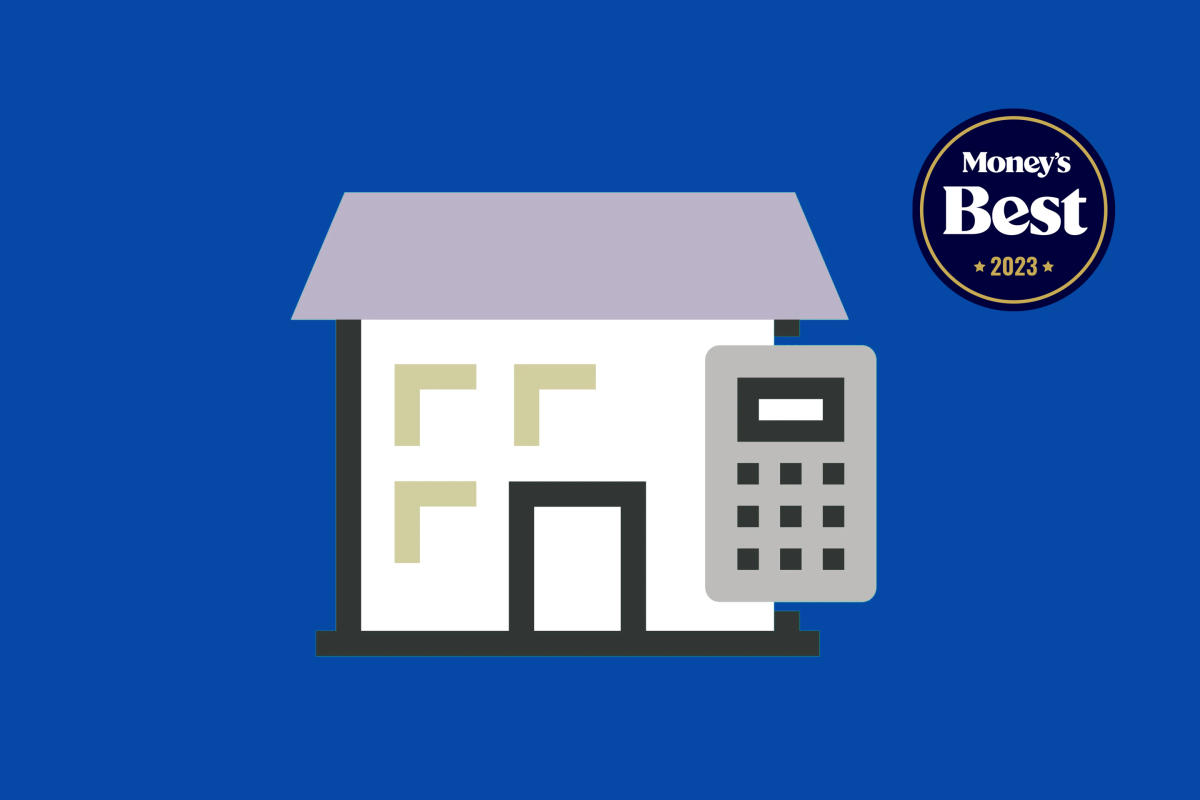Personal Finance
8 Best Mortgage Refinance Companies of May 2023

Our Partners
Our Partner
Apply Now
-
America’s Trusted Refinance Lender, A+ BBB Rating
-
Historically Low Rates – See Today’s Interest Rates
-
Online Mortgage Application and Live Agents Available
-
Cash Out, Debt Consolidation Options Available
-
Pay Off Higher Interest Rates Credit Cards, Pay College Tuition
-
Offers Flexible Terms from 8 to 30 Years
Our Partner
Apply Now
-
Start that home repair, improvement or other big project.
-
Get rates and terms personalized for your unique needs.
-
Use online tools that put the power in your hands.
-
Enjoy award-winning client service.
-
Subsidiary of Quicken Loans
Our Partner
Apply Now
-
Prequalify online in minutes
-
Compare multiple offers and rates
-
“Accurate quotes, not estimates”
-
Fixed- and variable-rate conventional, FHA, VA, USDA and jumbo loans available
-
Rated #1 for customer satisfaction by LendingTree
-
No SSN required to prequalify and view customized rates
Our Partner
Apply Now
-
Highest in customer satisfaction in the U.S.
-
Award-winning client service & A+ rating with the BBB
-
eClosing allows customers to close electronically to save time
-
Multiple loan & refinance options to fit your needs
-
Fortune 100 Best Companies to Work For 2017
-
Proud supporter of college athletics
Our Partner
Apply Now
-
An award winning lender backed by Goldman Sachs
-
No lender fees or commissions
-
Instant loan estimates, 24/7 on-demand rate lock
-
Fast pre-approval in as little as 3 minutes
-
Streamlined to close up to 10 days faster than industry average
-
Terms and Conditions apply. See Here
Our Partner
Apply Now
-
600 minimum credit score
-
Access your home’s equity with a Cash-Out Refinance
-
Refinance up to 95% of your primary home’s value
-
FDIC Bank since 1919 with A+ BBB Rating
-
Pay off your mortgage at any time—no pre-payment penalties
-
Free, personalized rate quote
Refinancing your mortgage is one way to improve your financial position, but for the move to make sense, you need to find the right lender. The best refinance companies will offer competitive interest rates, a smooth application process and a variety of loan options to choose from.
Before you begin your search, use Money’s mortgage refinance calculator to estimate how much you can save by reducing the interest rate on your home loan. Next, compare offers from multiple lenders. We think these eight mortgage lenders are a great place to start.
Our Top Picks for the Best Mortgage Refinance Companies of May 2023
-
Rocket Mortgage – Best Refinance Lender Overall
-
loanDepot – Best for Online Mortgage Refinancing
-
Zillow – Best Marketplace
-
Better – Best for Fast Closing Time
-
Navy Federal Credit Union – Best Credit Union
-
Ally Financial – Best for Jumbo Loans
-
Nationwide – Best for Custom Loans
-
Bank of America – Best for Member Discounts
Best Mortgage Refinance Reviews
Why we chose it: We chose Rocket Mortgage (formerly Quicken Loans) as the best overall mortgage refinance company for its excellent track record in customer satisfaction and web-based customer support. It’s also popular: In 2022, Rocket originated more mortgages than any other company in the United States.
Pros
-
Rated best mortgage servicer by JD Power
-
Largest mortgage originator in 2022
-
Streamlined online application process with eClosing
-
Features a mortgage refinance rates calculator
Cons
-
No in-person service, but you may reach out to an affiliated broker
HIGHLIGHTS
- J.D. Power Rating
- NMLS Regulatory Actions
- Min. Credit Score
- Refi Loan Types
Rocket Mortgage (NMLS ID# 3030) has ranked in the top 3 in the J.D. Power U.S Primary Mortgage Origination Satisfaction Study for eight consecutive years. You can choose to complete your application online, or by phone, with help from one of the company’s home loan experts. In many cases, you can also get in-person assistance from an independent mortgage broker affiliated with Rocket.
Rocket Mortgage’s offerings include Fannie Mae’s RefiNow and Freddie Mac’s Refi Possible, which are refinance options for homeowners with a debt-to-income ratio of up to 65% who currently have a mortgage with one of those government-sponsored enterprises.
Homeowners who qualify for these programs will see a reduction of at least 0.5% of their interest rate and can apply for a grant of up to $500 to cover appraisal costs. Applicants must have a good payment history, a FICO credit score of 620 or higher and at least 3% equity in a one-unit primary residence to be eligible.
Other refinancing options allow homeowners to shorten their term or access their home equity with a cash-out refi.
Why we chose it: We chose loanDepot as the best online mortgage refinance company because of its widespread availability across the U.S.
Pros
-
Licensed in all 50 states with over 200 locations in 43 states
-
Streamlined digital platform
Cons
-
Loan rates are not available online
HIGHLIGHTS
- J.D. Power Rating
- NMLS Regulatory Actions
- Min. Credit Score
- Refi Loan Types
loanDepot (NMLS# 174457) stands out for its “mello smartloan,” a digital portal that uses artificial intelligence to verify asset and employment details, perform credit checks and begin the home appraisal process. The online application can be completed in a matter of minutes.
Choosing loanDepot for a mortgage refinance comes with another perk: If you’ve refinanced with the company before, its Lifetime Guarantee will waive your lender fees on future refinances. You can also qualify for a half-point fee waiver on closing costs if you refinance an existing loanDepot home equity line of credit (HELOC) into a new HELOC.
loanDepot also services its loans, so you’ll be dealing with the same company for as long as you hold the loan. The website provides educational resources on the refinancing process and has a calculator that will give you an estimate of your new mortgage payment if you decide to refinance.
While the lender’s digital application process is streamlined and fast, loanDepot also has over 200 locations throughout the United States for borrowers who may prefer more personal attention.
Why we chose it: We chose Zillow as the best mortgage refinancing marketplace for its ability to connect homeowners with a variety of licensed lenders throughout the country, and its array of tools that help guide the process.
Pros
-
User-friendly mobile app
-
Wide range of online resources, including a mortgage calculator
-
Easy access to competitive rates, updated daily
-
Most of the application process is performed online
-
Licensed in 49 states and the District of Columbia, not licensed in NY
Cons
-
No program to help homebuyers with bad credit
HIGHLIGHTS
- J.D. POWER RATING
- NMLS REGULATORY ACTIONS
- MIN. CREDIT SCORE
- REFI LOAN TYPES
Zillow Home Loans (NMLS ID#: 10287) is the affiliate company of Zillow, Inc., the real estate listing site, but it also offers access to thousands of lenders across the country, including mortgage bankers and brokers, credit unions and community banks.
Zillow Inc.’s Lender Directory allows you to search for a mortgage provider by city, state/territory or zip code. You can also search for a specific bank or loan officer if you have a recommendation from a friend or family member. You’ll be able to read customer reviews before deciding which lenders to apply with, and submit your information directly on Zillow’s website to be paired with local and national lenders (who will contact you directly).
Zillow also has a mortgage refinance rate comparison tool, which lets you compare average interest rates for different types of loans (including conforming, government-backed and jumbo loans) as well as different term lengths. Updated daily, the tool can give you an idea of what mortgage interest rate you can expect to qualify for when you apply for a refinance, and compare the market average with the rate you’re offered.
As with any marketplace, once you contact a lender, you’ll be dealing with that company directly and Zillow will no longer be involved in the process.
Why we chose it: We chose Better as the best mortgage refinance company for fast closing times. Homeowners can get a rate quote and a letter of preapproval in just a few minutes — and it comes with a price match guarantee.
Pros
-
Fast online process, with competitor price-match program
-
No origination, application or underwriting fees
-
Smart tech automatically looks for and applies eligible discounts
Cons
-
Online-only, no brick and mortar branches
-
Limited refinance loan type options
HIGHLIGHTS
- J.D. Power Rating
- NMLS Regulatory Actions
- Min. Credit Score
- Refi Loan Types
Better Mortgage (NMLS ID# 330511) is an online lender with a refinance process that’s fast and straightforward. It also offers some of the lowest closing costs in the industry.
Better says it can afford to forego some of the fees charged by traditional brick-and-mortar lenders — such as application, underwriting and origination fees — because they operate fully online. Additionally, it offers a price guarantee if another lender offers homeowners a more competitive price on one of the refinance products Better offers.
Better customers get direct access to a dedicated loan officer, who can help them navigate the application process by phone. Or they can opt to upload and sign all their documents through the lender’s website instead. The entire process, from application to pre-approval, can be done in as little as one day.
Customers who recently purchased a home with Better can qualify for up to $3,500 in lender credits toward closing costs if they refinance within three years of obtaining their original loan. Borrowers can use Better’s mortgage payment and amortization calculators to estimate their new monthly payments and how much interest they can save over time with a refi.
Why we chose it: We chose Navy Federal as the best mortgage refinance credit union because of its fast online pre-approval process, choice of loan terms and benefits for borrowers who are also selling.
Pros
-
Online pre-approval application
-
Doesn’t require private mortgage insurance (PMI)
Cons
-
Membership is limited to veterans, active-duty military, and their families
-
No FHA, USDA loans, construction loans, or reverse mortgages
HIGHLIGHTS
- J.D. Power Rating
- NMLS Regulatory Actions
- Min. Credit Score
- Refi Loan Types
Navy Federal (NLMS# 399807) has mortgage refinancing options for its members, ranging from 10- to 30-year loan terms for their VA Streamline (IRRL) and Homebuyers Choice. The lender also offers the Military Choice loan for those who have exhausted their VA loan option. In addition to VA loans, Navy Federal can refinance FHA and conventional loans.
Realty Plus and Navy Federal Title Services are tools that facilitate the mortgage refinance process for homebuyers looking to refinance or sell and buy new property. Realty Plus connects you with an agent coordinator to assist with your mortgage application. Further, if you close your mortgage with Navy Federal using Realty Plus, you can get between $400 and $9,000 cashback.
Navy Federal also offers HomeSquad, an option for potential borrowers to get a faster preapproval for a purchase or refinance loan. Once the application is submitted, HomeSquad allows borrowers to track their loan status 24/7 (online or through a mobile app), upload documents easily, request forbearance assistance and a number of other account activities.
Why we chose it: We chose Ally Financial as the best mortgage refinance company for jumbo loans due to its higher-than-average lending cap and lack of lender fees.
Pros
-
Online application, document uploads, and electronic signature options
-
No lender fees
-
Quotes don’t impact your credit score
-
No PMI with a down payment of 20%
Cons
-
You may be required to pay PMI if your down payment is less than 20%
HIGHLIGHTS
- J.D. Power Rating
- NMLS Regulatory Actions
- Min. Credit Score
- Refi Loan Types
Ally Financial (NLMS# 181005) stands out for its jumbo loan offerings of up to $4 million. For this type of loan, Ally offers a higher lending amount than its competitors, which usually cap that amount at $2 million.
Borrowers must pay a down payment of at least 20% for jumbo loans and provide evidence that they can cover expenses for a certain number of months. Unlike other lenders, Ally accepts restricted stock units as reserve capital.
Ally offers other types of refinance loans, including conventional fixed and adjustable rate mortgages, rate and term loans and cash-out refis. Ally doesn’t charge any lender fees, and says it can close on loans up to 10 days faster than its competitors.
New customers can apply, submit documents and sign paperwork online. Borrowers can also find rates and a refinance mortgage calculator, along with other information regarding refinancing and jumbo loans, on the Ally website.
Why we chose it: We chose Nationwide as the best mortgage refinance company for custom loans because of the variety of products and flexible lending options and its cash back perk.
Pros
-
Options for self-employed and low credit buyers
-
Customizable terms
-
$0 lender fee offer
-
Free consultations
Cons
-
Only operates in CA, CO, TX, ID, WA, OK, MT and ND
HIGHLIGHTS
- J.D. POWER RATING
- NMLS REGULATORY ACTIONS
- Min. Credit Score
- Refi Loan Types
Nationwide offers mortgage refinance loans in partnership with AXOS Bank (NMLS # 524995). The company provides a full gamut of loan options, including rate and term and cash-out refis, all of which can be customized to meet the borrower’s needs.
Borrowers can also get up to 3% annualized cash back on mortgage payments made from Axos’ Total Loan Rewards Checking Account, which can add up to a tidy sum. Depending on the loan amount, and contingent on opening an Axos Bank Checking Account, the bank will either reduce or eliminate its lender fees.
The application process can be completed online or by phone with one of Axos’ lending officers.
Borrowers can get an instant rate quote online by providing basic information like loan amount, credit score and the property’s location. Axos also offers a rate watch option to alert when mortgage rates reach your desired level.
Why we chose it: We chose Bank of America as the best mortgage refinance company for member discounts. Its Preferred Rewards program offers significant price reductions on purchase and refinance closing costs.
Pros
-
Exclusive membership discounts available on both purchase and refinance closing costs
-
Physical branch locations available nationwide
-
Considers alternative credit data such as utility bills and rental payment history
Cons
-
No renovation loans
HIGHLIGHTS
- J.D. Power Rating
- NMLS Regulatory Actions
- Min. Credit Score
- Refi Loan Types
Bank of America (NMLS# 399802) members can benefit from its Preferred Rewards program by qualifying for a closing cost reduction of up to $600 from their purchase or refinance origination fees.
The program works in tiers ranging from Gold to Platinum Honors, with discount levels based on members’ banking and Merrill investment account balances. Some benefits of the program require enrollment in PayPlan, an automatic payment service linked to a Bank of America deposit account.
Like many other lenders, Bank of America provides a range of digital services to borrowers: customers can apply for a refinance loan directly online or an appointment can be scheduled with a loan officer at any of Bank of America’s branches.
Other resources include an online refinance calculator and home value estimator designed to give borrowers an idea of how much they could save with a refi.
Other mortgage refinance companies we considered
Through our research on the mortgage lending industry, we found that many of the biggest lenders don’t necessarily offer the best refinance products. (Though they might excel in other areas.)
Chase Review
Why we didn’t choose it: We didn’t choose Chase (NMLS# 399798) because of the high number of regulatory actions and customer complaints filed with the Consumer Financial Protection Bureau within the past five years.
Pros
-
The sixth-largest originator of mortgage loans in the country (In 2020)
-
Large variety of loans: ARMs, 10-, 15-, 20-, 25- and 30-year mortgages, FHA and VA loans and DreamMaker Mortgage Program
-
Competitive mortgage interest rates
-
Online Refinance Learning Center with calculators for loan estimates, interest rates and terms
Cons
-
Several regulatory actions with the CFPB within the last five years (although none filed within the last four years)
-
High number of customer complaints with the CFPB
HIGHLIGHTS
- J.D. Power Rating
- NMLS Regulatory Actions
- Min. Credit Score
- Refi Loan Types
PNC Bank Review
Why we didn’t choose it: We didn’t choose PNC Bank (NMLS# 446303) because the application process cannot be fully completed online.
Pros
-
Has current mortgage rates and helpful calculators on its site
-
Home insight planner and application tracker
-
Considers non-traditional credit history
-
Online mortgage preapproval
Cons
-
The process can’t be fully completed online
-
No branches in AK, AZ, AR, CA, CT, HI, ID, IA, LA, ME, MN, MS, MT, NE, NV, NH, NM, ND, OK, RI, SD, UT, VT, WA or WY
HIGHLIGHTS
- J.D. Power Rating
- NMLS Regulatory Actions
- Min. Credit Score
- Refi Loan Types
SunTrust Review (now Truist)
Why we didn’t choose it: We didn’t choose SunTrust (NMLS# 399803) because there is no transparent information on fees and closing costs on the website.
Pros
-
Online mortgage application and tracking software
-
Comprehensive educational resources
Cons
-
Customized rates are only available with an application
-
Branches only in AL, AZ, DC, FL, GA, MD, NC, SC, TN and VA
-
Fees not available online
HIGHLIGHTS
- J.D. Power Rating
- NMLS Regulatory Actions
- Min. Credit Score
- Refi Loan Types
Alliant Credit Union Review
Why we didn’t choose it: We didn’t choose Alliant Credit Union (NMLS# 197185) because of the limited number of refinancing options available.
Pros
-
Rate watch sends a notification when rates have hit your target
-
Complete the application process online
Cons
-
No government-backed loans
-
Doesn’t disclose loan fees
-
No in-person banking
-
Must be a member to qualify
HIGHLIGHTS
- J.D. Power Rating
- NMLS Regulatory Actions
- Min. Credit Score
- Refi Loan Types
Guild Mortgage Review
Why we didn’t choose it: We didn’t choose Guild Mortgage (NMLS# 3274) because its loan products are not available in all states.
Pros
-
Online mortgage application, e-signatures and digital loan process tracking
-
Direct lender, services its own loans
-
Closing cost and total payment calculator
-
Highest rated by JD Power’s US Primary Mortgage Originator Satisfaction Study
Cons
-
Not available in NY or NJ
-
Rates aren’t available online unless you apply
-
Does not disclose fees
-
Branches only in 33 states
HIGHLIGHTS
- J.D. Power Rating
- NMLS Regulatory Actions
- Min. Credit Score
- Refi Loan Types
U.S. Bank Review
Why we didn’t choose it: We didn’t choose U.S. Bank (NMLS# 402761) because of its below-average customer rating.
Pros
-
Variety of refinance loan offerings
-
Rewards homeowners with an existing first mortgage with U.S. Bank
-
Great online tools, with a fully digital application and a proprietary app
-
Provides general mortgage rates, with the option to see results by state
-
Online prequalification
Cons
-
Customer satisfaction rating was below average
-
Mortgage rates on the website assume a higher-than-average credit score
HIGHLIGHTS
- J.D. Power Rating
- NMLS Regulatory Actions
- Min. Credit Score
- Refi Loan Types
AmeriSave Mortgage Review
Why we didn’t choose it: We didn’t choose AmeriSave Mortgage (NMLS# 1168) because of the high number of regulatory actions lodged against the company.
Pros
-
Wide variety of loan options
-
Closing time average of 25 days
Cons
-
High number of regulatory actions with the NMLS
-
Doesn’t disclose origination fees or closing costs
-
Not available in New York
HIGHLIGHTS
- J.D. Power Rating
- NMLS Regulatory Actions
- Min. Credit Score
- Refi Loan Types
Veterans United Home Loans Review
Why we didn’t choose it: We didn’t choose Veterans United (NMLS# 1907) because it offers limited refinancing options.
Pros
-
Free credit counseling
-
Representatives available 24/7
Cons
-
Only has physical branches in 18 states
-
Won’t refinance FHA or USDA loans
-
Doesn’t disclose closing costs or fees
HIGHLIGHTS
- J.D. Power Rating
- NMLS Regulatory Actions
- Min. Credit Score
- Refi Loan Types
Mortgage Refinance Guide
If you’re a first-time homebuyer, you’re probably anxious to put the mortgage application process behind you for good. But if you bought at a high interest rate, knowing you have the option of refinancing into a lower rate in the future — and how to go about doing that — can be useful.
When you refinance, you replace your current loan with a new mortgage. Our mortgage refinance guide is designed to help people refinancing their home loans for the first time make an informed decision. Read on to learn about different types of mortgage products, the benefits of refinancing a mortgage and what documents financial institutions require for a complete application.
Types of mortgage refinance
By understanding the different loan types, you can zero in on the best mortgage refinance lenders and products for your needs.
Rate-and-term refinance
A rate-and-term refinance allows you to take advantage of low rates. You take out a new loan with the same loan balance as your existing mortgage. Ideally, you’ll get a low interest rate, a shorter term length or both. Rate-and-term is the most common type of refi.
What to know:
-
You can also use this type of refi to switch from an adjustable-rate mortgage to a fixed-rate mortgage.
-
Also known as a “no-cash-out refinance.”
What to watch out for:
-
You’ll have to pay closing costs, as well as go through the appraisal process, for a second time.
Zero-closing-cost refinance
Some lenders offer “no-closing-cost” or “zero-closing-cost” refinance loans to qualifying applicants.
What to know:
-
You’ll still pay closing costs (and any interest that accrues), but they’ll be rolled into your mortgage loan and not an upfront cost.
What to watch out for:
-
Closing costs are folded into the principal loan amount, so monthly payments are higher than rate-and-term refinance loans.
Cash-out refinancing
One of the benefits of homeownership is the long-term increase in home values. A cash-out refinance converts a portion of the home equity you’ve accumulated into cash, similar to a home equity loan or home equity line of credit (HELOC). A cash-out refi replaces your existing mortgage with a new loan at a higher balance.
What to know:
-
Allows you to take advantage of an increase in your home’s value with a tax-free cash advance paid to you at closing.
-
Many borrowers use these loans to fund home improvements.
What to watch out for:
-
You could end up with a higher interest rate and monthly payment.
-
Make sure you borrow an amount that’s feasible to pay off.
Cash-in refinance
A cash-in refinance allows borrowers to lower their mortgage principal during a refinance negotiation. With this type of loan, the borrower makes a lump sum payment on their mortgage, lowering the principal balance on their new loan.
What to know:
-
This option may improve the chances of an underwater mortgage qualifying for a refinance.
-
If you pay down enough of the principal to bring your home equity above 20%, it will eliminate your monthly private mortgage insurance (PMI) payments.
-
Most lenders require a loan-to-value ratio (LTV) of at least 80%.
What to watch out for:
-
Your funds will be tied to your home, so you won’t be able to use them to pay off other debt, cover emergency expenses or invest.
Streamline refinance
Streamline refinance allows borrowers to refinance existing government-backed loans, such as an FHA loan, USDA loan or VA loan, with limited documentation or underwriting.
What to know:
-
These loans generally don’t require appraisals and may or may not require employment and income verification.
-
You’ll need to show a history of on-time monthly mortgage payments.
What to watch out for:
-
Government-backed loans come with specific qualification requirements for borrowers.
Low-income enterprise-backed mortgage refinance
In summer 2021, Fannie Mae and Freddie Mac implemented new refinance options for low-income borrowers. Eligible borrowers can now refinance their mortgage at a reduced interest rate and lower monthly payments.
What to know:
-
According to the Federal Housing Finance Agency (FHFA), borrowers may save an estimated $100 to $250 a month.
To meet eligibility requirements, borrowers must:
-
Have a mortgage backed by Fannie Mae or Freddie Mac (the Enterprises) for the house they live in
-
Have an income at or below 80% of their residential area’s median income
-
Have no missed payments in the past six months and no more than one missed payment in the past 12 months
-
Have a debt-to-income ratio below 65% or a FICO credit score of at least 620
-
Have a mortgage loan-to-value (LTV) ratio lower than 97%
-
Other federal loan programs that could help consumers who are facing financial hardship include Hope for Homeowners (HFH) and the Home Affordable Refinancing Program (HARP).
What to watch out for:
-
This option is not available for cash-out refinance loans
-
You need to have lived in the home for at least one year before doing this kind of refi
-
Only applies to single-family homes
How does refinancing work?
Refinancing a mortgage works by replacing your existing home loan with a new one. That means your interest rate, monthly payment and loan term will all change.
Say you obtained a $300,000 mortgage at 6% interest, with a monthly payment of $1,799. After 14 years, you have a remaining balance of $223,000 and decide to refinance into a new 30-year mortgage at 5% interest. Your new monthly payment will be $1,197, and your new payback time is 30 years.
Many homeowners are attracted to refinancing because of the possibility of finding lower interest rates, but there are other reasons for taking out a new home loan — like using home equity to pay off higher-interest debt and shortening the term of the loan.
If, for example, you have an outstanding balance of $247,000 on your 30-year mortgage after seven years at 6% interest, your current monthly payment would be about $1,499. You can refinance into a 15-year fixed-rate loan at 5%, which would bring up your monthly payment to $1,949, but you’ll pay off your home in a total of 22 years instead of 30 (and save a lot of money on interest in the process).
How soon can you refinance a mortgage?
How soon you can refinance your mortgage will depend, in part, on the requirements outlined by your lender — like having a good credit score and enough money in the bank to cover the costs of refinancing.
The type of loan you have will also affect your refi timeline. In the case of conventional loans, you may be able to refinance immediately. Some lenders may require a ‘seasoning’ period, where you have to make a minimum number of monthly payments before being eligible to refinance, which you may be able to circumvent by choosing a different lender.
For FHA loans, you’ll need to have made at least six monthly payments before you can do a rate and term refinance. VA loans also require at least six months of payments, while USDA loans require 12 months of payments.
For a cash-out refinance, you’ll need to have a record of between six and 12 months of payments before you can refinance, depending on the type of loan and the lender. If you’re thinking about refinancing your loan, check with your lender to see what requirements they may have.
Should you refinance your mortgage?
If you’re on the fence about going through with a mortgage refinance, here’s some info on the pros and cons of refinancing, what the money can be used for, and the documentation you’ll need to provide to complete an application.
Under the right circumstance, refinancing can help:
-
Secure a lower interest rate on your mortgage
-
Lower your monthly payment
-
Shorten your loan term
-
Pay off higher-interest debt like credit cards
-
Improve your personal finances
Should I refinance with my current lender?
Before selecting a refinance mortgage lender:
-
Shop around and request loan estimates from multiple lenders
-
Look into current mortgage rates to see if you can find a better APR than you have now
-
Use our mortgage refinance calculator to get an idea of how much you could be saving.
What do you need to refinance your mortgage?
There are three primary factors lenders consider when reviewing mortgage refinance applications: credit score, debt-to-income ratio and loan-to-value ratio (LTV).
-
A low debt-to-income (DTI) ratio: You need a DTI of up to 43% for conventional loans or less than 50% for an FHA mortgage refinance, according to the Consumer Financial Protection Bureau (CFPB). Use our DTI ratio calculator to figure out where you stand.
-
A healthy FICO credit score: Most mortgage refinance lenders require a minimum credit score requirement of 620, but you’ll get the best rates for a score that’s 740 or higher.
-
A Loan-to-value ratio (LTV) of 20% or more: LTV is the amount of the loan you want to take out divided by the appraised value of your home.
You will also have to submit additional paperwork related to your income and the property you are refinancing.
Documentation required to apply for a mortgage refinance:
☑ A copy of your government-issued ID or Social Security card
☑ Proof of income for the last 30 days
☑ W-2s for the past 2 years
☑ Federal tax returns (personal and business) for at least the last 2-3 years
☑ Written explanation if employed less than two years or if there’s a gap or change in employment
☑ Address of property to be refinanced and purchase contract
☑ Homeowners’ insurance information such as the agent’s name and contact information
☑ Bank statements and statements of assets
☑ Bankruptcy/ discharge papers (if applicable)
When is refinancing your mortgage not the best idea?
Just because you can refinance doesn’t mean you should.
For starters, if your new interest rate isn’t at least 0.5 to 0.75 percentage points lower than your previous one, most experts argue it’s not worth it.
Refinancing also means new closing costs and other potential fees. If you won’t recoup those costs, it doesn’t make sense to refinance — even if you’re making a lower monthly payment. You should also reconsider a mortgage refinance if:
-
Your refi terms won’t save you much in interest
-
Your credit score has taken a dive since your original mortgage
-
Your new minimum monthly payment will be out of your budget
-
You have plans to move out in the near future
Latest News on Mortgage Refinance
Although mortgage rates have been trending lower over the past few months, homeowners thinking about a mortgage refinance are still facing a less-than-perfect refi market.
The average mortgage rate for a borrower with a 700 credit score is in the low 7% range. Recent homeowners, however, bought or refinanced into much lower rates during the pandemic. Refinancing at a higher rate might not make financial sense right now.
There could be opportunities to refinance in the future, however. Most experts believe the Federal Reserve will stop making increases to the federal fund rate soon, a strategy the central bank has used over the last several months to slow down inflation. If the pause does happen, rates will likely stabilize soon, and then drift lower later this year.
Lower rates may provide homeowners who bought at last year’s highs the chance to lower their monthly payments. For example, the typical mortgage payment on a $300,000 loan at 7.2% would be $2,036. Lowering the rate to 6.8% reduces the payment to $1,956.
Before jumping in headfirst, take a good look at your finances and determine if now is the right time to refinance.
As with any type of loan, be sure to consider the pros and cons of a refinance before making a decision. If you decide to go ahead, these steps can help you get started:
-
Define your refinancing goal (e.g. lower your rate, shorten your term, etc.)
-
Check your home equity
-
Check your credit score and credit report
-
Calculate whether refinance costs will be worth it
-
Get your W2, 1099 forms and other documents ready
-
Shop for a lender
-
Lock in your rate
Best Mortgage Refinance FAQ
What is refinancing?
When you refinance a mortgage you replace your current loan with a new one with a different term length, interest rate or amount borrowed. Ideally, refinancing can help you save money on your mortgage by negotiating a lower interest rate or reducing the number of years you need to pay.
How often can you refinance your home?
There is no limit to the number of times you can refinance your mortgage. However, the closing costs associated with refinancing can be expensive. Just because you can always refinance your home doesn’t mean you should do so. Make sure to calculate your breakeven point.
How much does it cost to refinance a mortgage?
Closing cost to refinance a mortgage can cost around 2% to 6% of your loan amount. This includes fees for the loan application, loan origination, home appraisal, and mor. With a no closing cost refinance loan these fees get rolled into the loan balance or interest rate.
Should I refinance my mortgage?
You should refinance your mortgage if you can lower your monthly payments, shorten your loan term or negotiate some other type of tangible benefit. A refinance could make sense if you can lower your interest rate by at least 0.50 percentage points. Before opting for a refi, make sure the new terms and payments won’t put you in a financial bind.
Can I refinance my home with bad credit?
You can refinance your home even if you have bad credit, but it won’t be easy. You will likely be offered a higher interest rate than someone with a better credit history. However, if you’ve managed to improve your credit score or accumulate a large amount of savings that can be used to reduce the size of the loan, the positives could outweigh the negatives.
When to refinance a mortgage?
The best time to refinance a mortgage is when interest rates are lower than when you locked in your rate and closed on your current mortgage. Refinancing when rates are lower will allow you to reduce your monthly payments. You may also refinance to a shorter term and pay more each month but save on interest over the life of the loan.
How We Chose the Best Mortgage Refinance Companies
Our methodology considered:
-
Lenders that provide a quality customer experience with online tools, pre-approvals, discounts or exclusive refinance programs
-
Lender size, reputation and number of complaints.
-
Ratings and data from the Mortgage Bankers Association, J.D. Power’s U.S. Mortgage Origination Satisfaction Study and the NMLS (Nationwide Multistate Licensing System or “Nationwide Mortgage Licensing System”)
-
Consumer feedback and expert input
Summary of Money’s Best Mortgage Refinance Companies of May 2023
-
Rocket Mortgage – Best Refinance Lender Overall
-
loanDepot – Best for Online Mortgage Refinancing
-
Zillow – Best Marketplace
-
Better – Best for Fast Closing Time
-
Navy Federal Credit Union – Best Credit Union
-
Ally Financial – Best for Jumbo Loans
-
Nationwide – Best for Custom Loans
-
Bank of America – Best for Member Discounts
© Copyright 2023 Money Group, LLC. All Rights Reserved.
This article originally appeared on Money.com and may contain affiliate links for which Money receives compensation. Opinions expressed in this article are the author’s alone, not those of a third-party entity, and have not been reviewed, approved, or otherwise endorsed. Offers may be subject to change without notice. For more information, read Money’s full disclaimer.
Read the full article here

-

 Passive Income7 days ago
Passive Income7 days agoJoin the Highest-Growing Industry in 2025 With This $60 Cybersecurity E-Learning Bundle
-

 Side Hustles5 days ago
Side Hustles5 days agoAI Agents Are Becoming More Humanlike — and OpenAI Is Launching a New One in January. Are Entrepreneurs Ready to Embrace the Future?
-

 Passive Income5 days ago
Passive Income5 days agoSending A Last-Minute Marketing Email? Follow This 7-Step Checklist to Avoid Making These Costly Mistakes
-

 Investing4 days ago
Investing4 days agoCheck it Out: An AI Multi-Tool for Any Budget
-

 Investing4 days ago
Investing4 days agoMaersk asks customers to remove cargo before potential strike at US ports By Reuters
-

 Investing7 days ago
Investing7 days agoMorgan Stanley boosts consumer finance outlook for 2025 By Investing.com
-

 Investing6 days ago
Investing6 days agoLifetime Digital Asset Management Made Simple for Businesses
-

 Side Hustles7 days ago
Side Hustles7 days agoLooking to Sell Your Company? Here’s a Potentially Lucrative Exit Plan Every Business Needs to Consider.


















